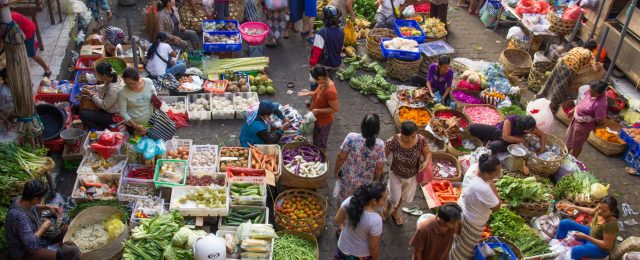Empowering smallholder farmers is key for a successful food system transformation

Written by Luiza Margulis
Smallholder farmers produce up to 34% of our global food supply, and control roughly 30% of global crop production, according to IPBES. Almost all of these farms are located in developing countries, with close to 600 million farms worldwide. Evidently, the world relies heavily on the productivity and efficiency of smallholder farmers to satisfy our global food needs. As global population rises, so does our demand for food; but farmers’ ability to increase the global food supply to match demand is severely threatened by a number of factors, such as climate change, a lack of access to markets and, more recently, COVID-19.
Agricultural workers face vulnerabilities from climate change impacts and lack of market access
Agriculture is one of the sectors that is most vulnerable to climate change. Its unpredictability is expected to have direct impacts on agricultural productivity due to rises in temperatures, changes in the frequency and intensity of precipitation and of extreme weather phenomena. In most of the developing world, research suggests that “adaptation will be crucial to offset expected negative climate change impacts on food security and agriculture development”. Productive assets, technologies, finance, and education are all essential tools to support smallholder farmer productivity (FAO). Despite playing an essential role in ensuring food security and nutrition, smallholders face many challenges in securing access to profitable markets, particularly in developing countries. Poor market linkages prevent farmers from shifting towards productive forms of exchange (ILO). It is important to create value-added market linkages to facilitate access. For example, buyers and farmers can share value and risk equitably by creating sustainable and longer term contracting practices. Businesses could help farmers to organise collectively in farmer cooperatives and unions. Also, physical infrastructure and access to technology can be improved and companies can help facilitate access to tailored financial services, such as pre-financing schemes, for farmers with cash constraints.
COVID-19 highlights challenges, old and new, in a sector already under threat
The COVID-19 pandemic has brought new challenges for smallholder farmers in developing countries. In addition to the risks already posed by climate change and market access, the impacts of the COVID-19 pandemic have been creating further challenges to a sector that is already under threat (WBCSD). Country lockdowns and restrictions on movement have disrupted certain parts of the food value-chain, especially in vulnerable regions and communities. In Uganda, the National Farmers’ Federation is facing constraints among its farmer members in receiving seeds and other agricultural inputs due to border closures (WFO). According to the Asia-Pacific Farmers’ Forum, farmers in Laos are unable to transport products to market because of the lockdown, but even when they can, smallholders are unable to sell their produce because customers are not attending the markets. Recent research also shows that up to 85% of smallholder farmers in Nigeria are at risk of losing all of their dry season investments due to COVID-19.
The current crisis has brought to light innovative solutions to help mitigate the shock of this pandemic and its impact on smallholders. According to FAO, IT-supported information systems have been vital to identifying response plans and redirecting funds and investments. In order to adapt to social distancing measures, farmers across the world have relied on existing digital services and platforms to sell their products (WFO). ‘E-services’ provide information to farmers about market demand and prices, creating fewer interruptions upstream.
Though this pandemic is not over, it has highlighted many vulnerabilities already present in the food value chain. Identifying these challenges helps companies and governments to develop more resilient supply chains to support smallholder farmers, who are essential to the food supply chain (WBCSD).
Smallholder farmers are major change agents and essential to the food system transformation
The World Benchmarking Alliance (WBA) believes that farmers are at the heart of the food system transformation. As producers of an enormous portion of the global food supply, smallholder farmers are at the forefront of the change we need to see, from the sustainable management of the environment to growing more nutritious food. As both producers and beneficiaries, smallholders should be empowered as active agents within the food system transformation agenda.
In November 2019, WBA held two farmer events in Kathmandu and Nairobi to understand what food system transformation means to them, the issues they face and what they need from companies to meet the challenge. Company representatives were also invited so that the perspectives of farmers could be heard directly and that both parties could come up with solutions together. The insights from the discussion helped to build of the methodology framework of the Food & Agriculture benchmark; you can be access the summary report [PDF 0] : here.
Moving forward it is essential that we democratize the food system transformation agenda, so that farmers voices are heard equally to civil society, governments and investors alike. We believe that each stakeholder has a unique role to play, but it is crucial to align on the agenda to collectively drive change. In doing so we ensure that those who are most impacted are connected to those with the most influence. That is why WBA is formalizing partnerships with farmer organisations, alongside other stakeholder groups, so that the interests of farmers are central to the conversations around the role of the private sector in building a sustainable food future.
Our [PDF 1] : methodology framework for the Food and Agriculture benchmark, launched recently during the UN High-Level Political Forum, highlights the key dimensions where businesses can step up and contribute towards a resilient food system transformation. The benchmark will assess 350 companies on multiple topics across the environment, nutrition, and social inclusion dimensions and will be the first of its kind to assess leading companies across the entirety of the food system. We invite stakeholders to join the conversation and to help us in the next stages of methodology development and engagement activities.
For more information and contact details, please refer to: https://food.worldbenchmarkingalliance.org/